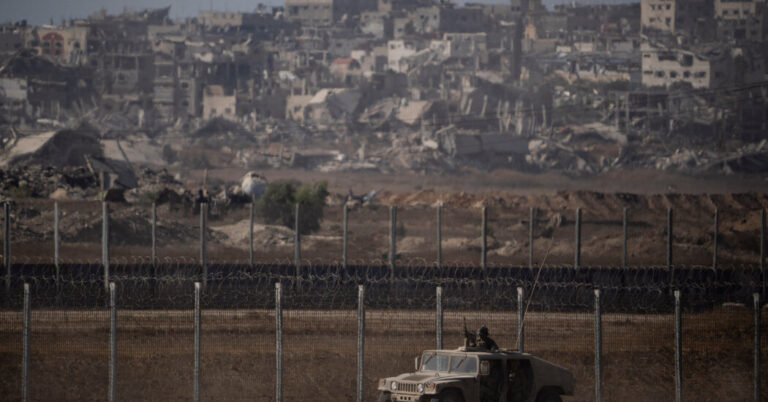A new problem is disrupting aid convoys trying to deliver relief to starving Gazans: attacks by organized mobs seeking not the flour and medicine the trucks are carrying, but cigarettes smuggled inside the shipments.
In the tightly blockaded Gaza Strip, cigarettes have become increasingly scarce, now selling for between $25 and $30 each. Coordinated attacks by groups seeking to smuggle cigarettes for profit are a major obstacle to the delivery of desperately needed humanitarian aid to southern Gaza, according to UN and Israeli officials.
Israeli authorities tightly control everything that enters and leaves Gaza through Israeli-run checkpoints. But for weeks, cigarettes have managed to slip through on aid trucks, mainly through the Kerem Shalom crossing in southern Gaza.
To evade Israeli inspections, smugglers — mostly in Egypt — hid them in bags of flour, diapers and even a watermelon donated by the United Nations, according to aid agencies and an Israeli military official who shared photos with The New York Times.
Aid trucks leaving the crossing into Gaza were later attacked by mobs of Palestinians, some armed, searching for cigarettes hidden inside, UN and Israeli officials said.
Andrea De Domenico, who heads the U.N. Office for the Coordination of Humanitarian Affairs in Jerusalem, confirmed that aid officials had “seen U.N.-branded aid boxes with cigarettes inside.” He said the smuggled cigarettes had created “a new dynamic” of organized attacks on aid convoys.
Israel’s near-total control over goods entering Gaza amid the war has distorted the enclave’s economy. The price of flour has plummeted in some parts of Gaza because Israel, under intense international pressure to combat hunger, has allowed aid agencies to pump in large quantities. Other goods, which enter less frequently, remain scarcer and more expensive.
Mr. De Domenico showed the Times images he took during a recent drive along the Kerem Shalom road into Gaza: full sacks of flour can be seen strewn along the roadside, apparently of little interest to looters.
“Their main goal was to look for cigarettes,” said Manhal Shaibar, who runs a Palestinian transport company in Kerem Shalom that transports U.N. aid.
Authorities said most of the trucks carrying cigarettes appeared to be coming from Egypt, which diverted trucks arriving from Egyptian territory through Kerem Shalom after Israel took control of the Rafah crossing in early May. Shaibar attributed the smuggling operation to Bedouin families with a presence in both Gaza and the Egyptian Sinai.
The looting is a result of the lawlessness that has prevailed in much of the Gaza Strip since the tenth month of Israel’s war against Hamas. Israeli forces have targeted Hamas’s government apparatus and police without installing a new administration in their place, creating a situation of widespread lawlessness.
As the situation in southern Gaza worsens due to a new wave of evacuation orders from the Israeli military, the contents of more than 1,000 trucks of humanitarian aid have been stuck for weeks on the Gaza side of the Kerem Shalom crossing, according to Israeli authorities. Fearing attacks, aid agencies are reluctant to send trucks to collect and distribute the goods.
Israel says it has made efforts to allow UN agencies to retrieve the goods, including by building new roads, and notes that private traders have been able to endure the harsh conditions to retrieve their goods. Aid officials say Israel could do much more, including allowing them to use other roads and crossings.
Convoys carrying UN aid are often an easier target than private businessmen, who are willing to pay hundreds or thousands of dollars. protection money dollars to the guards or organized gangs themselves.
According to U.N. and Israeli officials, smugglers outside Gaza work closely with organized groups inside the territory that block aid trucks with small arms, batons and improvised roadblocks. Once they successfully stop the convoys, the looters often seem to know precisely where to find the cigarettes hidden inside, De Domenico said.
“These attacks are very targeted,” he explained. “They are aimed precisely at the pallet” where the cigarettes are located.
Col. Elad Goren, a senior official at COGAT, the Israeli agency that oversees Palestinian civil affairs, said the smuggling appeared to have come from Egypt; others familiar with the trafficking shared his assessment.
“We managed to recover most of the packages,” Col. Goren said. “But we believe that something needs to be done on the Egyptian side to stop the smuggling.”
The Egyptian government’s press office did not immediately respond to a request for comment.
A cigarette vendor in Gaza City said prices could reach $40 a cigarette for the most sought-after brands. Desperate smokers were willing to pay high prices, despite being impoverished after months of war, he said.
The vendor, who spoke on condition of anonymity for fear of reprisals, said Hamas forces were still present in the area, but not as law enforcement police, but simply as “mafias.”


